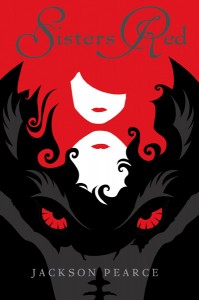 Why I read this book
Why I read this book
It’s taken me a year and a half to read this book. I originally came across Sisters Red in the context of a recommended reading list by Bitch magazine that went viral after complaints from readers caused the removal of three titles from the list. Different reasons were given for the removal in each case and Sisters Red was charged with victim blaming. The best reasons for the victim-blaming charges relate to a review posted by The Book Smugglers which the author herself took issue with in the comments. (The Book Smugglers also posted an update after the Bitch controversy.)
I decided then to decide for myself about the three contentious books and added two to my reading list. I have finally reached Sisters Red on the pile ‘o doom.
Genre and cover
Sisters Red is a modern retelling of Little Red Riding Hood in a dark urban setting.
Its strong cover (pictured above) is really excellent and speaks of good marketing and a good understanding of the message of the book. However it did lead me to expect that one character would have red hair and the other black – which isn’t true to the text.
What I thought about the book on the first read
This is the author’s second novel and for early work it’s very good but it is missing some subtleties and depth that I’d expect from a more experienced author.
Sisters Scarlet (19) and Rosie (16) are werewolf or “Fenris” hunters as a result of a devastating attack when they were children in which their beloved grandmother died and Scarlet was horrifically scarred: losing an eye and gaining a passionate determination to fight the Fenris at all costs. The novel begins when Scarlet’s old friend and former hunting partner Silas (21) returns from an extended vacation after inheriting property from his “woodsman” family.
There’s a good mix of action and exposition and the device of having the principle characters tell the story in alternating chapters works well. It does mean that we only see Silas from the point of view of the sisters and he tends to seem a bit too perfect. He is patient with Scarlet’s obsession with hunting and tries to encourage Rosie think for herself, he’s rich but not boastful and sad about his bad relationship with his jealous siblings and senile father. Silas is a nice guy and Rosie is a nice girl and love gradually blossoms during the course of the narrative causing inevitable tensions as Scarlet is possessive of her sister and determined that nothing should come between the three and the moral imperative of slaying all the Fenris.
The Fenris are evil predatory male werewolves who are attracted by revealing clothing and the colour red and prey upon young women and girls who Scarlet refers to as “dragonflies” with their iridescent makeup and dazzlingly attire. When a Fenris dies it disappears in a puff of black smoke – conveniently for law enforcement and news media who have no conception of the existence of the Fenris despite there being seemingly hundreds of them around and distinctive pack insignia tattoos.
One of the areas where this novel could use more depth is in the cast. There really only are three characters in this book: Scarlet, Rosie and Silas. I felt there was a missed opportunity to develop the world through interactions with anyone beyond the trio. Scarlet is completely wedded to her “job” but even when Rosie attends classes the only people she meets are walk-on characters or more Fenris. There’s an intriguing homeless man but he’s not developed into more than a one-liner.
At one point Rosie goes shopping and recognises an old friend in the pharmacy. Sarah is now a “dragonfly” girl who talks about makeup and clothes with a gang of other pretty girls, one of whom whispers that Rosie is the sister of “that girl who got torn up”. Rosie then meets up with Silas and the focus of attention changes to their relationship. This reads as a missed opportunity to me. I’d like to see Rosie try to communicate outside her circle and I feel she makes assumptions about Sarah and her friends that are unwarranted given that Rosie dropped out of school two years earlier and hasn’t seen these people since. Perhaps their comment on Rosie’s sister seems harsh but within the context of the narrative this is how Scarlet sees herself: as scarred and undesirable.
Another missed opportunity is the clubs. The Fenris hang out at clubs and prey upon dragonfly girls, this is well established. Scarlet both despises the clubs and believes the bouncers wouldn’t let her in because of her scars. At one point (one of the contentious passages in the victim blaming debate) Scarlet and Silas discuss the dragonflies and Rosie as follows:
“It’s like they’re trying to be eaten, isn’t it? he asks pointedly.
“Can I tell you how glad I am that and Rosie aren’t like them?”
“No kidding.” I grin, relieved. “Rosie could be if she wanted, though. She’s beautiful like they are.”
“Beauty has nothing to do with it. Rosie could never be one of them. Do you really think they’d dress and act like that if they knew it was drawing wolves toward them?”
Having now read the entire book I’m afraid I have to agree that there are problematic passages in Sisters Red although this passage cited by the Book Smugglers is probably the nadir of the victim-blaming. It doesn’t get any worse than this. I think the problem is that the author is trying to work through several ideas at once.
Firstly, the cognoscenti versus the unenlightened (wizards v muggles) plot. The trio know about the Fenris and there’s a metaphor used at several times of Plato’s cave and shadows that indicate a wider truth. Pearce is trying to make a point about innocence and experience.
Secondly, there’s also the sisters dynamic. Scarlet sees Rosie as the self she could have been if not mutilated and scarred. In her eyes Rosie is a potential dragonfly, she is not.
Thirdly, there’s the Silas story. His nice guy mystique compels him to make unflattering comparisons being the hunter sisters and the frivolous dragonflies. Unfortunately, it comes across as judgemental to the feminist reader.
The trouble is because we never enter the clubs (we including author, characters and readers) we don’t get to see the dragonflies as people: as young girls simply enjoying themselves. We don’t see them as individuals with their own fears and doubts and issues. I would have liked to see Rosie dress up in silk and glitter and go clubbing – except that I fear the result would be a Fenris attack – but if she could speak to the dragonflies as people perhaps we’d get the some more nuance to the apparently judgmentalism.
To this feminist reader the dragonfly girls and Scarlet and Rosie and Silas too – should feel free to wear what they like and walk where they like without fear of being eaten by werewolves. But because revealing clothing, pretty dresses and strolls through the urban area inevitably result in such attacks Scarlet and by extension the author appear to take the view that girls should carry hatchets and dress for combat. That’s the victim blaming.
There’s a deeper problem too which I didn’t see cited in other online reviews. At one point Scarlet finds a predatory man menacing a young girl and comes at him with a hatchet only to discover that he’s simply a pedophile, not a Fenris. She then lets him go and doesn’t even consider filing a police report. This is anther missed opportunity. I’d have liked to see Scarlet kill the man – or at any rate question her value system. Because this reads uncomfortably as though human predators are an acceptable hazard and inhuman ones require vigilante justice. I don’t think any of this is intentional but it does detract from the book as a feminist-friendly read.
One final issue with the plot twists. At the point they discover that a potential Fenris has SuperUnusual!Trait that’s extremely close to Unusual!Trait that Silas has, I think it deserves further thought and comment from the trio than effectively ‘so some people have unusual traits, weird huh?’. I’d like a little ‘there but the grace of god, go I’ about it. The niceness of Silas is not expressed in great intellectual gifts and the girls both dropped out of school too young to have much aptitude for research as their hit and miss and jump to conclusions method bears out.
I found the book a quick read and I was completely gripped. There’s a lot to like in the quality of writing and the whole approach to a dark fairytale. I think it could have used a stronger edit and more questioning about the problematic passages. The core of the narrative is one of female strength and choices and more nuanced consideration of the moral questions would have contributed to the power of the eventual conclusion.
If I had to rate this out of 5 I’d give it 2 but that would rise to three with cuts of the problematic bits and to 4 if they were rewritten the way I want them to be in my head. Extra bonus points for giving me cool dramatic Fenris-slaying dreams last night!


 When I was 19 I was offered a two book contract on the basis of one book part written and one yet to be decided. Second book syndrome kicked in while I was still at university and still very unsure of my own ideas. I suggested a second book in the same series, a sequel to my first, or rather the middle book of a possible trilogy. It wasn’t my aim was to push the company into contracting me for a third. Although I had a number of new ideas I also wanted to continue the story I’d started with the characters of my first novel. Ultimately what decided the issue was that the first novel was selling well and the publishing company seemed keen to continue with more. They published the whole trilogy, which continues to sell well to this day.
When I was 19 I was offered a two book contract on the basis of one book part written and one yet to be decided. Second book syndrome kicked in while I was still at university and still very unsure of my own ideas. I suggested a second book in the same series, a sequel to my first, or rather the middle book of a possible trilogy. It wasn’t my aim was to push the company into contracting me for a third. Although I had a number of new ideas I also wanted to continue the story I’d started with the characters of my first novel. Ultimately what decided the issue was that the first novel was selling well and the publishing company seemed keen to continue with more. They published the whole trilogy, which continues to sell well to this day.